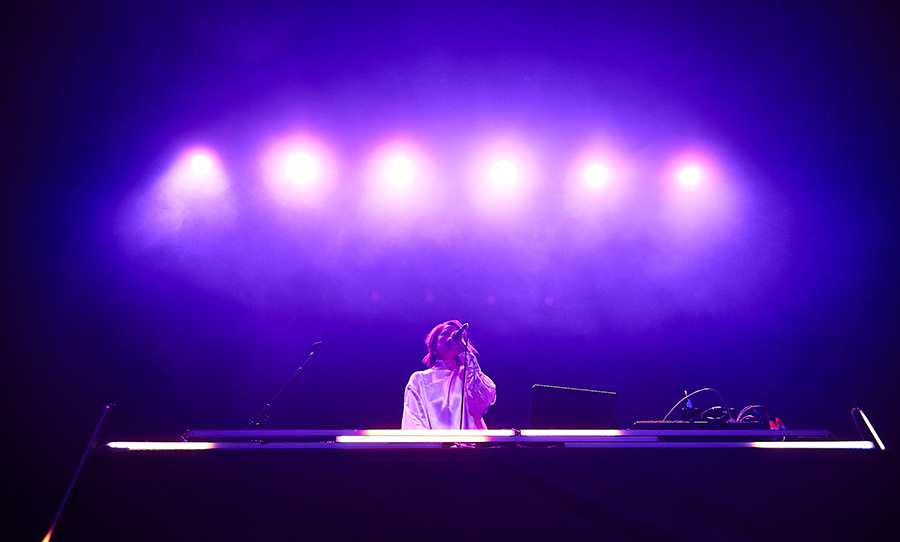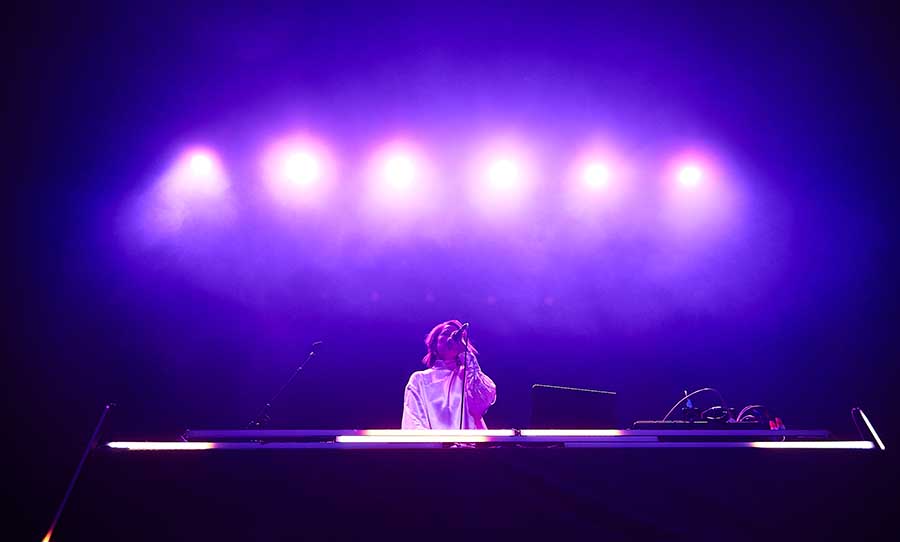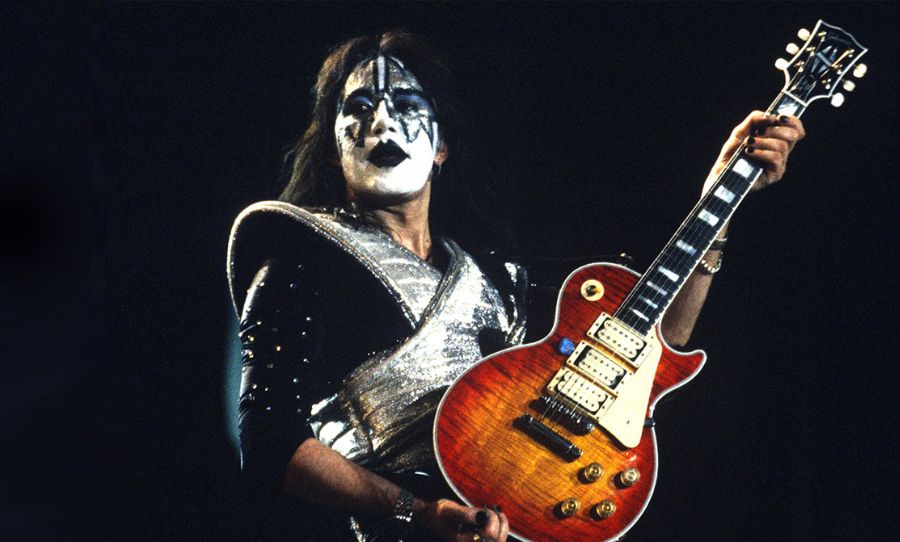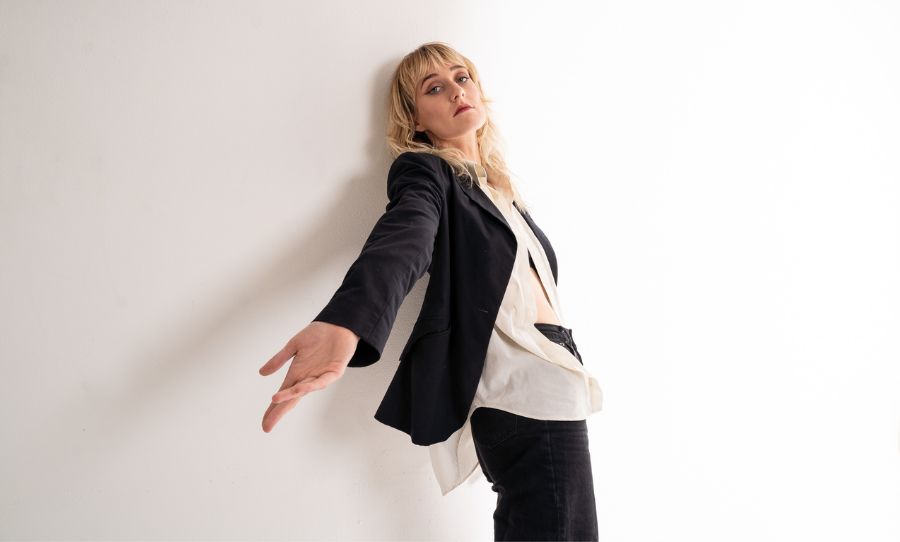It’s fair to say Beatrice Lewis has a lot on her plate. Finally, she believes she’s learning to manage it all while staying sane.
Beatrice Lewis is an Australian musician and producer who splits herself between several different projects. There’s the high energy dance crew Haiku Hands, the emotionally charged Indigenous group Kardajala Kirridarra, and finally, her own solo work as Beatrice.
Lewis is the thread which connects the three, her production skillset playing a central part in the success of each. It makes her an incredibly interesting person to talk shop with; she’s creates self-inflicted audio, time management, and creative problems as fast as she solves them.
Sitting in her Melbourne home studio while Brian Eno played in the background, we chatted at length about her production style, creative flow, collaborative talents, gear choices, and more. She also talked about the debut Haiku Hands album she’s now finished – from which the first single Manbitch was just released – as well as yet another new project to come.

HAPPY: I was immediately a little bit surprised seeing your setup, because I’ve seen you perform on stage and it seemed like you’d be a very in-the-box type person.
BEATRICE: [Laughs] Yeah. I look like a techno, technology person.
HAPPY: So you’re a fan of actual hardware?
BEATRICE: Yeah.
HAPPY: Always have been?
BEATRICE: Yeah, I guess with a lot of the music I loved growing up, like Portishead and Radiohead and stuff like that, they had a real analogue element and I think I’ve always been chasing that sound a little bit. I really love that sound.
HAPPY: What DAW are you using?
BEATRICE: Ableton.
HAPPY: Now you do work between multiple projects. When you’re looking for something to buy, whether it’s a plugin or a piece of gear, are you looking for something that has as broad a use as possible?
BEATRICE: I love these questions, and I’ve just been trying to work this out. I just bought a new sound card, and like, how the fuck do I make four ins and six outs work over three different projects? And the answer is it’s quite hard. And so I have built a really specific library for Haiku Hands. My Beatrice setup is different again – but I can use the same sound card for different setups. They’re quite different, they’re different setups for everything. And if I’m buying a new plugin… if it’s for writing, I would just get it ’cause it’s for writing and that could be for any specific project. But yeah, if it’s for live, I need to have specific things for each setup.
HAPPY: So something that’s nimble. What about portable?
BEATRICE: The portable thing is such a big thing. Haiku Hands is currently three Pelicans plus my backpack and rollie bag.
HAPPY: It could be a lot worse.
BEATRICE: I know! We’re not even a band, it’s funny.
HAPPY: On the production side of things, jumping between everything, is there a configuration that you go to for each project? Or do you basically start with a blank slate every time?
BEATRICE: It’s a blank slate every time, yeah. And I have such a different role in each of the different projects. When I’m opening up each kind of session it’s quite a different headspace.
HAPPY: I can imagine. I find it very difficult to jump between styles, when writing at least. When you’re in a band and someone’s giving you something to play, that’s a whole different story… I guess what I’m asking is, is there some heavy time management that goes on for you?
BEATRICE: Yes, for the last two or three years, particularly in the first year and a half, two years, it was everything all at once. And it was a bit overwhelming. And then in the last year, it was primarily Haiku Hands. I’ve worked out that the way to do it is to section up time. So we’ve just finished a Haiku Hands album, and I pretty much worked on that for the last two months. And now it’s finished. Now I’m actually starting a documentary score and that’ll be the next month. And then I’m writing a new EP, it’s rock, more synth-y. It’s compartmentalising them so they aren’t all happening at the same time. Because it’s mental when that happens, it’s too much.
HAPPY: That seems to be where most people tend to land.
BEATRICE: It took me a long time.
HAPPY: Do you write rules for a project before you start?
BEATRICE: I never had before but we just talked about doing that for this next EP, which has got a lot of… restriction. We were thinking to have drums, two synth lines, a bass, and a vocal part, and try to keep it as raw as possible so it’s less electronic, because I’ve been in such an electronic bubble for so long. Having these jam nights on Tuesday nights have been so fucking good because it’s really raw, live, and spontaneous. And I think all three of us who are writing it, we just want to make something and put it out.
HAPPY: Sweet. That EP’s with Joelistics and who else?
BEATRICE: Thomas Mitchell, he’s the drummer [I live with].
HAPPY: Haiku Hands, to me, is something that doesn’t have many rules.
BEATRICE: No rules. But also… it’s got no rules but it was one of those ones that started off where we were trying to be less laboured about it, so that we just made decisions and put things out. But it’s gotten laboured, when you get to the end of the album, everything gets slightly more laboured but I’m still keen to re-energise that feeling of writing and releasing and not holding things so tightly. I think that’s a practice as an artist that’s good to get into.
HAPPY: How much cross pollination is there between projects? Like you’ll write a bassline for one thing, but then it ends up somewhere else?
BEATRICE: That happens a lot. I actually have started quite a cool thing in my mind where I’ll just start writing whatever I feel like writing and then I’ll be like, ‘ah, that’s for that.’ That’s kind of nice. I’m excited now that the album’s finished to start writing and to start letting things go where they want to go. It’s really cool to have lots of different outlets, like ‘this is a Beatrice track,’ it’s super emotional and introspective. ‘This is a Haiku Hands track,’ it’s way more fun and banging.
HAPPY: To talk about like your actual style, for Beatrice and Kardajala Kirridarra at least, despite it being very production heavy, it still feels quite natural. Is that important?
BEATRICE: Thank you. Yeah, I think what we were talking about before with hardware and stuff like that, I still love really high fidelity, super highly produced music like Holly Herndon and people like that. I love that stuff, but I actually have a real feeling that I want things to be tactile and real. Rather than being super clean and digital and whatever. That doesn’t necessarily mean hardware, just what timbres feel more textural, I guess.
HAPPY: Do you do any field recording? Or found sounds?
BEATRICE: I do a lot of stuff with my voice. I do a lot of recording like, weird breathing and stuff like that. Where I’m like, ‘these are basically sex noises.’
HAPPY: When no one’s around, or?
BEATRICE: Totally. But just anything that feels tactile and human. I like having that in sound, particularly with Kardajala Kirridarra. We did a lot of recording in the desert, like clap sticks that Eleanor’s dad made, and wind, and storms. A lot of tree sounds and shaking pods, stuff that makes you feel like you’re there because it’s so special. There is a really specific soundscape [in the Northern Territory] which isn’t anywhere else.
HAPPY: You did some recording in sheds and things right? In the desert?
BEATRICE: Yeah! We had to turn the air con off to record, and there’s a few [backing vocals] where you can hear…
[Beatrice attempts to make an air conditioner noise]
BEATRICE: … because we forgot to turn it off.
HAPPY: The voice thing. You supported Jon Hopkins recently. I’ve heard him talk about that exact same thing where he’ll start a synth sound from his voice. Is he a production hero?
BEATRICE: Totally. Jon’s really good. He’s definitely got some cool sounds going on and I really like the space in his music. I know he listens to a lot of Brian Eno as well, and I think Brian Eno has the same thing. It feels like there’s space, which I really love in life in general. So music can help you facilitate that in your life. I feel like Holly Herndon is a real pioneer into sound and thought and AI, and I love stuff like that as well. She’s really cool because she’s not nostalgic at all. She’s like, ‘I’m just not into analogue in any way, shape or form at all. Let’s just go forward.’ I really love that.
HAPPY: On the space thing, does that translate into the physical world? Do you think having a studio space like this is essential?
BEATRICE: I’ve had lots of studios. I’m embarrassed you’re here but I’ve spent a lot of time on the interior design of my studios because I really like them to feel… to walk in and to have a know that they have a certain feel.
HAPPY: I don’t think that’s embarrassing at all. I think that can be just as important as your sound card.
BEATRICE: For me, yes. People have ended up using my studio a lot because they just really like being in there and you know, it’s got a good feeling. I guess a few other heroes that I really love… there’s a guy called Mark Pritchard. He’s so unbelievably diverse. He’s also a legend, a really nice guy. I like so much different music. You can hear it, I guess, in Haiku Hands and Beatrice and then this new stuff we’re about to make. I just really love exploring sound and emotions and different places.
HAPPY: We were talking about ways to find new sounds. Is there a way that you set out to find something new? Are you one for stacking an insane amount of effects on a sound, or are you trying to search your existing gear for what you would call something that’s interesting?
BEATRICE: Both. So I spent the last two days working on a documentary pitch. For me, doing stuff like that is really cool because you’re making music from a very different place. You’re not making it from an internal expression out, you’re responding to something, you know what I mean? Rather than having a direct response. The documentary is about men serving life without parole, so everything that I was making couldn’t be too emotive or couldn’t be too dramatic because it felt like it was making my story cheesy. It felt like I was undermining their story. I actually spent a lot of time in contact, so finding samples, using samples, and then putting up a huge chain of effects. I mean, I do a lot of resampling, so I’ll then re-record the reverb, then I’ll start working on the reverb and do something with that, then I’ll re-record that. It’s just like an endless chain of resampling, pretty much.
HAPPY: And how do you know when something’s done?
BEATRICE: How do you know? I don’t know, I just have to hand it in, it’s never done. I just run out of time.
HAPPY: Are you someone who happily enforces some kind of restriction on yourself, or do you have trouble with that?
BEATRICE: Well, I mean, I don’t really know anyone that doesn’t have trouble with that. I just have to have deadlines, which is kind of cool, now. It’s taken me a long time and I now have a really good team and this is now my work. So I just have to hand stuff in – I had to hand in [the documentary soundtrack] yesterday, even though it wasn’t done to me. I could’ve kept working on it for days.
HAPPY: But that can be healthy.
BEATRICE: It’s good. The other thing that I was going to say with the sound stuff, I don’t really feel I’m a good enough producer that I can hear a sound and I can immediately go and make it. Which is cool because it just means that at the moment a lot of my processes are exploratory and also kind of naive. It’s like putting stuff on the master, resampling… you know what I mean? Just making mistakes and being like ‘that’s a very fucking cool mistake!’
HAPPY: That journey before destination mentality.
BEATRICE: Totally.
HAPPY: I was going to ask about some collaborative stuff. You’ve mentioned this one documentary and you’ve done a fair bit of other scoring. What was that?
BEATRICE: For film, I’ve done one or two other environmental documentaries, but I’ve done a lot of theatre scoring, which is really cool. I love doing it. I’ve done a bunch where I’ve done them live and then I’ve done a bunch where I’ve made them pre-made.
HAPPY: Very cool. That’s something I don’t think I’ve heard from a musician before.
BEATRICE: Yeah, well I’m fucking made for it. I’m the soundscape queen.
HAPPY: Right, so not only composition. Like background noise, soundscapes?
BEATRICE: Not so much like foley, like sound design. It’s more like scores.
HAPPY: So you’d say it’s very important collaborating into different disciplines?
BEATRICE: Yeah.
HAPPY: Do you learn different lessons from visual artists or people in theatre than you do for musicians?
BEATRICE: Definitely. I love art in general and I love talking to people who create and finding out about their practices, what’s hard and what’s easy. Like actors, I find, are really present and strong and way more in your face, because they have to be. That’s part of the practice, part of the art form, whereas musicians can sometimes be a little bit more introverted and removed, which is also just part of that process. And I like that.
HAPPY: I think it’s interesting, the term ‘bedroom producer’ or even just ‘producer’ has a solitary connotation but I think it’s a little bit outdated. With how easily accessible people are at the moment. How easy it is to collaborate, and stuff like that. Like you’re a producer, but you work in two bands with four people each.
BEATRICE: I love collaborating. It’s not like I’m a solo artist, even with the Beatrice I collaborate on most tracks with other people. It’s my favourite thing to do. I’m keen at some point to write a completely solo album, but I’m not ready for that. I still feel like I’m learning and… I love getting songs to a point, and then I’m like, ‘okay, this needs some fresh energy,’ because I sometimes find I can kill something if I work on it too much. I like things to have life and, you know, spark. It’s fine when you work with other people. Even if you don’t end up using anything that you work on together, it takes you in different directions.
HAPPY: I remember someone telling me, quite a long time ago – I hadn’t even thought about this – but how many really successful musicians are in their 20s? People who are actually at the top of the game, they’re all much older. It really does take that amount of time.
BEATRICE: So much time. Someone was saying to me 10 years is quite a common thing. 10 years! But that’s fine, and I can see it. I can see it in my own work, I like to see improvements. I’ve only really been doing it properly for the last three or four years. Before that I had a bit of a different focus, it was more focused on music as, like social development and a community development tool. It’s only really in the last three or four years that I’ve gone more into my own solo stuff. My own music as opposed to other people’s.
HAPPY: Now to talk about some live stuff.
BEATRICE: Yeah.
HAPPY: I think you’re in sort of a funny position, because I know a lot of producers struggle with transitioning from to a live show, right? But you’ve got this experience in two bands that are quite prolific live and have that element so sorted out. Despite that, did you still struggle when taking Beatrice live?
BEATRICE: So I mean, I struggled to start Haiku Hands because I’d never been out from behind the desk. It’s like, ‘what the hell? What do I do with my legs?’ But then over the last three years I’ve gotten really confident and really enjoyed it. And now I love it. Then when I supported Jon a few weeks ago, it was really different to be back behind the desk. It made me miss the movement and the interaction, so coming back to Beatrice I want to get a wireless mic and make that more active, just be doing more, I guess. I’ve kind of got addicted to that much more live show.
HAPPY: Which is a little bit rare, in the electronic space.
BEATRICE: I was looking at people like Kučka, I was watching some footage from her Laneway show and she’s the same, she’s got a DJ and then she’s clearly got a little vocal effects unit or something going on. So there’s nothing there, she’s with the audience and she’s not behind a desk. Banoffee does the same thing. Tones and I, I saw, was doing a similar thing, coming out from behind the desk. I kind of liked it.
HAPPY: Just to clarify, what do you play live with Beatrice?®†
BEATRICE: I have Ableton and I have an [Akai] APC40, then I’ve got a MIDI Fighter. The APC40 is just controlling Ableton and has lots of effects on the beats and I can jump between clips and stuff like that. The MIDI Fighter has heaps of samples on it. And then I have three little Korg nanoKONTROLs. Each nanoKONTROL is a different vocal channel, so I pretty much have the same thing on each of them, but I have three vocal channels. It’s really cool. I use a Sugar Bytes plugin called Turnado which has a freeze-verb so I can freeze a note and then chop it up. I’ve got lots of gates, a looper, lots of different delays, different filtering effects…
HAPPY: So it is a very, very live show.
BEATRICE: Well, it is and it isn’t. It’s that thing where I could not do anything and it would play, or I can do heaps and it can be live. Which is a bit of a safety net. I’m gonna finish a Beatrice album in the next few months and I’m excited to just tear that apart for a completely new live show.
HAPPY: Do you DJ?
BEATRICE: Yes, I’ve just started. Mainly because I just love DJing – I’ve been DJing a bit for Haiku Hands – and it’s so much fun and I’ve also just been trying to learn as CDJs so I can go up to somewhere with headphones and a USB and that’s all the gear I carry.
HAPPY: DJing is easier to get into them putting on a live show, for sure. But I think musicians can learn a lot from either seeing DJs or DJing themselves. About crowd interaction, about what makes people dance and what people respond to…
BEATRICE: Totally. That’s a really cool learning curve. [Haiku Hands] have a really cool DJ set at the moment that’s like, all the tracks that we love listening to, it’s very hype and it’s very fun. And there’s so much good music out there. I just want to DJ to be like ‘listen to this tune!’
HAPPY: What’s the setup that you’re currently working on? You’re using Ableton as your DAW and you’ve got a new sound card, but what hardware are you playing on?
BEATRICE: So I’m using Ableton as the DAW, and then I just bought UAD and Apollo, so from that I’ve been using a bunch of new UAD plugins, which is really cool and exciting. I’ve got a [Moog] Sub 37 and then a Korg data DW-6000, a [Roland] Juno-6, then a piano which I really love. I’ve got a [Korg] PolySix as well which is getting fixed, and then [Ableton] Push. I use Push a little bit in actually making beats. Then an organ and just a really great mic that’s really malleable.
HAPPY: Just the one mic?
BEATRICE: Yeah, I only have one mic at the moment. If I do more intense recordings I’ll go to my friend’s studio, which is a good studio. This setup is really just for writing and editing. Then when I get something that I really like, like ‘cool, this is good,’ I’ll often go and work it in someone else’s studio and put more synths on it or mix it. Yeah, I didn’t do much mixing or any`thing like that. This is kind of a creative hub.
HAPPY: That’s cool. I think that’s a great professional distinction as well.
BEATRICE: That’s the collab thing. Something that I’ve worked out at the moment, and it really works for me, is to know your weaknesses. I know that I’m not great at mixing, I know that I really like working with drummers, so I kind of know the places where I’m not super good at the moment. And so then I get to work with other people in those areas. And working with other people, that’s my learning time. I’m like, ‘fuck yeah, now I know how to do that.’ Every time I work with people, it’s a little lesson.
HAPPY: I think even just the small change of going to a different space is important. Going somewhere your time is limited as well. It’s a mental thing, it’s time to switch on.
BEATRICE: You have to get something finished by that time because you have to deliver. You know, we’re going to be editing drums on Friday so I have to have the track down.
HAPPY: Sounds like you’re really about the deadlines now.
BEATRICE: Love the deadlines. It’s taken me years to put a Beatrice track out, and now like I’m all about finishing. We don’t start Haiku Hands touring ’til late May or June in the States. So before that time I want to finish a Haiku Hands album, I want to finish a Beatrice album, I want to finish this new synth EP, and then the documentary score, and then start a Kardajala [Kirridarra] album.
HAPPY: Very busy.
BEATRICE: Yeah, I quit drinking. I’m gonna smash through the next few months.
HAPPY: That’s the secret then?
BEATRICE: No! I mean, that only happened a week ago. But I really want to get all those things done and thought, ‘how do I get all these things done?’ Just don’t be hungover.
Manbitch, the new single from Haiku Hands, is out now. Look out for their debut album this August.



